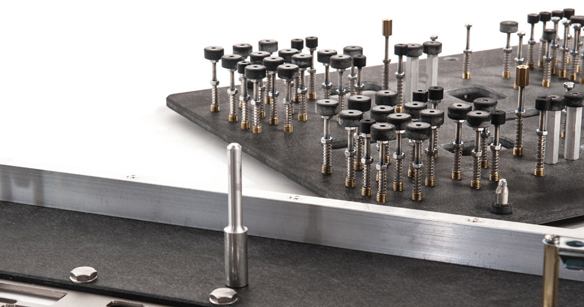Leutz Lötsysteme is a manufacturer of soldering frames and masks, which are used in wave and selective soldering systems. In order to achieve high reproducibility, the company uses high-performance materials such as Durostone, a plastic made of high-temperature glass fiber for special applications. Here it is important to know how plastics and the fluxes used behave in the soldering process. In addition to the materials used, the cleaning media are also a guarantee for a reproducible soldering process. "For us as a mask manufacturer, it is necessary to understand whether and how plastics, fluxes and cleaning media react with each other. For this reason, we have been working with Emil Otto for some time and are now intensifying this cooperation," explains Nicole Leutz, authorized signatory of Leutz Lötsystem GmbH.
Emil Otto has expanded its cleaning portfolio in recent years. Its own brand Etimol offers a wide range of cleaners for industrial applications, particularly for electronics production. "We have developed the Etimol PC 50 RAA and PC 55 CA cleaners especially for cleaning masks and frames," says Markus Geßner, Head of Marketing and Sales at Emil Otto GmbH. Both cleaners are water-based and reliably remove flux residues and outgassing from printed circuit boards. Furthermore, they do not attack the material of the solder frames and masks.
Leutz and Emil Otto tested the behavior of fluxes on Durostone in combination with Etimol cleaners. Various alcohol-based, alcohol- and water-based as well as purely water-based fluxes from Emil Otto were applied to the plastic. The plastics Durostone® CHP760, Durostone® CAS 761, Durostone® CAG 762 and Durostone® CFR 767 were used. The fluxes were then baked into the plastic at 270°C for 5 minutes. This test procedure was repeated several times to simulate the stress of a wave soldering process. Following the test process, the test materials were cooled down and cleaned in standard spray and ultrasonic cleaning systems. The cleaning time in the ultrasonic systems was 10 minutes at a temperature of 55°C. Etimol PC 55 CA, diluted with DI water, was used as the cleaning agent.
"As a result of these tests, it can be stated that all test materials are extremely compatible with the Emil Otto fluxes tested. No detrimental material change to the plastic was observed in the test, the material compatibility is extremely good and the flux residues were reliably removed," emphasizes Geßner. The Etimol PC 55 CA cleaner, diluted with DI water, also showed excellent cleaning results in repeated test and cleaning cycles in the automatic spray and ultrasonic cleaning systems.
"We will continue to test the combinations of mask and solder frame materials, flux and cleaning agents together with Emil Otto in the future. This is the only way we can ensure that our products meet the highest customer requirements. Of course, Emil Otto and we are also open to specific customer inquiries. Our customers can draw on our joint experience. We are also happy to carry out the test presented here as part of an evaluation for our customers with other material combinations," adds Leutz.

